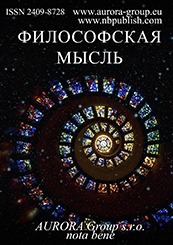Philosophy of knowledge
Reference:
Gribkov, A.A., Zelenskii, A.A. (2025). Formulation of the problem and definition of approaches to building semantic knowledge models for artificial intelligence. Philosophical Thought, 5, 1–13. https://doi.org/10.25136/2409-8728.2025.5.74407
Abstract:
The article examines the issues related to the creation of semantic models of knowledge that can be used to endow artificial intelligence systems with the ability to understand the meaning of text in natural or any other language. Possible means for constructing semantic models of knowledge include the mechanism of multi-system integration of knowledge developed by the authors earlier, formal ontologies, and techniques of understanding meaning that have emerged within the framework of philological hermeneutics. Significant components of the presented study include an examination of the currently used language models of artificial intelligence, a new approach to the conceptualization of knowledge through its generalization in the form of open models, an assessment of the genesis and prospects of teleological and axiological interpretations of meaning for natural and artificial cognitive systems. The methodological basis of the presented study consists of the authors’ developments in the field of systems analysis, well-known analytical methods adopted within hermeneutics, structuralism, classical epistemology, formal ontology theory, and linguistic and language modeling. The scientific novelty of this research lies in the determination of the necessary tools for creating semantic models that generalize knowledge. The mentioned tools include: multi-system integration of knowledge based on the integration of the subject of cognition into multiple systems with subsequent generalization of the patterns identified in these systems and their translation for solving tasks of understanding and creativity; formal ontologies that implement the description of knowledge from a specific domain in the form of conceptual schemes, taking into account existing rules and relationships between elements, allowing automatic extraction of knowledge; and a wide variety of hermeneutic techniques for understanding meanings. Objective limitations of use for artificial cognitive systems that lack subjectivity and value prioritization in understanding meanings are noted. Some limitations in the use for artificial cognitive systems are also found in hermeneutic techniques for understanding the meaning of text. This is related to the impossibility of full reflection without feelings, emotions, and desires generated by needs that also initiate subjectivity.
Keywords:
formal ontologies, patterns, multi-system integration of knowledge, cognitive system, artificial intelligence, knowledge, semantic model, value prioritization, needs, subjectivity
Philosophical anthropology
Reference:
Sergienko, A.Y. (2025). The (un)possibility of theodicy: the impact of the Lisbon earthquake on Enlightenment philosophical anthropology. Philosophical Thought, 5, 14–38. https://doi.org/10.25136/2409-8728.2025.5.74157
Abstract:
The article analyzes the influence of the Lisbon earthquake of 1755 on the transformation of philosophical and anthropological ideas of the Enlightenment. The main attention of the study is paid to the criticism of the Leibnizian project of theodicy and its axiological provisions, as well as the formation of the ideological categories of "optimism" and "pessimism" on the basis of this criticism. It examines how the catastrophe became a catalyst for rethinking the ontological, epistemological and ethical aspects of philosophical anthropology: the place of man in the "indifferent" cosmos, the limits of the rationalistic interpretation of the world, the problem of moral foundations in the conditions of structural injustice of the physical world. Particular emphasis is placed on the criticism of providentialism from the deistic positions of Voltaire and from the atheistic positions of the philosophers of French materialism. The role of the Lisbon earthquake in the development of Kant's pre-critical philosophy is examined in detail, with the intuitions of his early works being explicated in the theoretical structure of the critical period, on the basis of which the provisions of critical "optimism" are formed. The research methodology combines the historical and philosophical reconstruction of the discussion of Leibniz, Voltaire and Rousseau on providentialism, the discourse analysis of philosophical works that interpret the event of the Lisbon earthquake (Voltaire's "Candide, or Optimism", D. Diderot's "Jacques the Fatalist and His Master", and I. Kant's "pre-critical" works), and the interpretation of the concepts of "optimism" and "pessimism" in the optics of philosophical anthropology. The work demonstrates how intellectual receptions of the Lisbon earthquake not only explicated the "optimistic" crisis of Leibnizian theodicy, but also contributed to a rethinking of the historical and physical aspects of human existence. The author reveals that the materialistic optics in the philosophy of the French Enlightenment (D. Diderot, P.-A. Holbach, D. de Sade) interpreted human existence in the register of existential risks. The main conclusion is the thesis on the transformation of philosophical and anthropological ideas: man is defined as a finite being forced to seek ways to reconcile reason with nature in a post-catastrophic world. The study shows that Kant's synthesis, combining the epistemological "pessimism" of knowledge with the rationalistic "optimism" of the autonomy of reason, proposed a constructive model for modern philosophical anthropology, relevant in the context of new global challenges.
Keywords:
extinction, Immanuel Kant, Voltaire, Gottfried Wilhelm Leibniz, Enlightenment, progress, pessimism, optimism, theodicy, Lisbon earthquake
 This work is licensed under a Creative Commons Attribution-NonCommercial 4.0 International License.
This work is licensed under a Creative Commons Attribution-NonCommercial 4.0 International License.










 © 1998 – 2025 Nota Bene. Publishing Technologies. NB-Media Ltd.
© 1998 – 2025 Nota Bene. Publishing Technologies. NB-Media Ltd.




